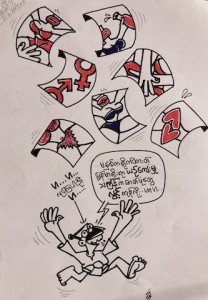Burma’s culture is heavily influenced by Buddhism, but in recent years some traditional celebrations have become commercialised. Over the Buddhist New Year the symbolic sprinkling of water to cleanse sins has been replaced by hoses and pumping music, while many young people use the holiday as a chance to let their hair down.
On DVB Debate’s panel this week: young writer Yu Ya; rapper Yone Lay; school teacher Hlaing Tint; and model Jessica Dada.
Panellists discussed whether the true meaning of Thingyan has been lost.
“Thingyan today is a mixture of happiness and disorder. Rather than enjoying Thingyan, it’s more like enjoying alcohol. Some people don’t even know the true meaning of Thingyan,” writer, Yu Ya said.
“When we see these people, they are so drunk that they can’t even stand up. As a young person, I accept drinking alcohol, but don’t go to extremes.”
Phyo Phyo Aung from the All Burma Federation of Student Unions said he believed Thingyan is the only time of year that young people can really be free to do what they want.
“As young people are oppressed in many different ways, they see Thingyan as an opportunity. That’s why, during Thingyan, they explode and do whatever they want. They know no one will stop or control them, so they use it as a chance to escape,” she said.
Women’s rights activist Nan Khine Yone, however, blamed the sale of alcohol for the unruly behaviour seen during Thingyan.

“In the past, alcohol and beer could not be bought freely. The seller just wouldn’t sell it to anyone without checking. Nowadays, they even sell booze to children. There are no restrictions,” she said.
The panellists discussed whether kissing on the mouth is unacceptable in Burmese society. In 2012, Yone Lay’s music video “Stupid” caused controversy for showing a kissing scene criticised for being insulting to the national culture. He insists it is just artistic expression.
“I was just trying to present the feelings I had when I was composing the song. I had no relationship with that girl. I told her ‘For the kissing scene, we will shoot it like this’, and so we that’s how we did it,” the rapper said.
Assistant lecturer at Yangon East University Hlaing Tint said artists have a responsibility to protect young people from viewing potentially offensive scenes.
“If these kind of images reach universities, schools or underage children, they might start to do the same thing all the time and in public. We need to control it,” he said.
Audience member Pyae Zaw Htet from Yangon School of Political Science argued that sexually explicit scenes in videos are not corrupting the youth of Burma.
“This sort of thing is just cultural change,” he said. “In my opinion, society is not being ruined by kissing, society is being ruined because people are less competent in their careers and education.”
As the country opens up and embraces global trends, many Burmese traditions are changing. Popular culture shared through increased television and Internet access is beginning to influence the way that people dress, act and speak. Panellists argued about the ethical implications of the changing trends.
“We cannot always blame someone and say they are at fault. Whether or not they are acting inappropriately depends more on their attitude and mindset than the way they dress,” said Yu Ya.
UFL Student Khin Myat Mon said society shouldn’t try to control how people dress.
[related]
“Last year, we all went out. People like me – university students – went out wearing shorts. But not all shorts are provocative,” she said.
Interviewed separately from the debate, artist and influential student leader Min Ko Naing said the focus should be on morality, not culture.
“We should be asking how can we change our ideas and our normative values. The way we dress and maintain culture is a separate matter. Culture is about the dignity of nationality and it is very delicate issue,” he said.
You can join the debate and watch the full programme in Burmese at dvbdebate.com
Or share your views with us by commenting on our website at dvb.no


